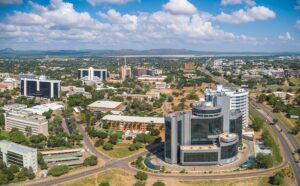For this blog post, I listened to the podcasts on Singapore and Botswana. While Botswana and Singapore are both located in the Global South, they are on different continents and thus interact with some different international organizations. In the example of Singapore, the international group of ASEAN empowers Singapore to make progress towards UN SDG Goal 16, which ensures that countries are peaceful and just, in their combatting of human trafficking. As addressed in the podcast, human trafficking is a massive problem in Singapore as a significant portion of the Singaporean workforce is made of migrant workers, many of whom are from Southeast Asia. Singapore also has an inter-agency task force to combat its human trafficking problem, which was launched in response to the United Nation’s national plan of action, and the creation of a prevention of human trafficking committee. The international factor of Singapore’s membership of ASEAN, a regional organization, helps Singapore by stabilizing the country through the ASEAN infrastructure fund, which improves economic success. This economic success, which is achieved, in part, through ASEAN membership allows Singapore to succeed at SDG 9 by improving its industries and infrastructure.
The Botswana podcast was focused on eradicating poverty and the implementation of peace, justice, and strong institutions. As stated, diamonds are the backbone of Botswana’s economy, which means that any change in supply or revenue affects the entire country’s economic status. Botswana has been empowered by international institutions such as the World Bank and the International Monetary Fund, who are trying to drive Botswana out of poverty, by working with the Botswanan government on their Vision 2036 goals. Both institutions are giving Botswana loans, but also assessing the government’s performance and use of these loans. Another example of these international institutions assisting Botswana came during the COVID-19 pandemic when the World Bank gave Botswana a 200 million dollar loan to create new jobs during the crisis. While these previous examples were focused on SDG 1, international institutions have also helped Botswana with SDG 16. For instance, the South African Development Community, an inter-governmental regional organization, is working to combat gender-based violence in Botswana. These inter-governmental organizations also work with non-profits, such as Genderlinks, to further prevent gender-based violence in Botswana.
The two Global South states I discussed above, Botswana and Singapore, have been empowered by international factors in their attempts to move towards the UN Sustainable Development Goals. However, other Global South states have surely not all had as positive, empowering results. For instance, my group’s country, Indonesia, although part of the G20’s Just Energy Transition Partnership, has seen less success with international factors. In Indonesia’s case, political corruption concerning state-owned company Persero blocking the approval of rooftop solar panels and the Minister of Investment being a stakeholder in coal mining has impacted the effectiveness of international factors in their development of SDGs. Additionally, other countries, like Indonesia, have climates that are less conducive to renewable energy sources, which would limit how empowering international factors are in making progress towards the SDGs.
All in all, international factors, for the most part, have empowered states of the Global South to further their progress toward SDG goals through funding and partnering with local organizations. However, individual countries’ circumstances, whether geographical, political, or something entirely different, can hinder how effective these international factors are at furthering the pursuit of these goals.

Indonesian Minister of Investment, Luhut Binsar Pandjaitan (US Department of State)

The African country of Botswana (Forbes Africa)

Singapore (CNN)
November 17, 2023 at 10:19 pm
Thank you very much for your informative post, Evelyn. It is very interesting how countries need to balance their sustainable development and other national interests, and how internal political dynamics are so important for the achievement of goals. How do you think countries that want to be proactive in assisting global south countries to achieve sdg goals should approach state corruption? Is there anything non domestic actors can do?
November 18, 2023 at 2:41 pm
Thank you, Evelyn Mullen Walsh, for providing a detailed exploration of how international factors influence the pursuit of Sustainable Development Goals (SDGs) in Singapore, Botswana, and Indonesia. Your analysis sheds light on the complexities and varied impacts of global interactions on the development goals of different nations.
The podcast talks about Singapore and Botswana are explored in your blog, with a focus on how international organizations like ASEAN affect Singapore’s progress toward SDG Goal 16 and how organizations like the World Bank and the International Monetary Fund help Botswana achieve its Vision 2036 goals. You also draw attention to the difficulties Indonesia, the nation of your organization, has had in reaching the SDGs as a result of things like geographic constraints and governmental corruption.
It’s fascinating to see how different international organizations have an impact on sustainable development initiatives in Singapore and Botswana. While ASEAN helps Singapore fight human trafficking, Botswana depends on organizations like the World Bank to eradicate poverty and promote economic growth. The comparison is further complicated by Indonesia’s problems, which include geographic limitations and governmental corruption.
According with the talk of global forces, it’s important to remember that certain countries in the Global South participate in South-South cooperation. In order to share resources, expertise, and technology, the Global South must work together on this. Comprehending the ways in which this type of collaboration enhances or differs from relations with wealthy nations may deepen the investigation of global impacts on SDGs.
Do you see chances for enhanced collaboration and knowledge-sharing across Global South countries to solve shared difficulties collectively, given the varying implications of international variables on the attainment of SDGs in different nations? With the various effects of global variables in mind, how may these countries use their distinct advantages and situations to help one another achieve sustainable development goals?
November 18, 2023 at 5:18 pm
Good post, I like how you clearly showed how the global south is not always harmed by international institutions as there is often an assumption that they would do so. Botswana and Singapore are two great samples of states that have made good progress in achieving their SDGs thanks to international support. Unfortunately, that has not always been the case. What factors do you think would influence countries to succeed/fail in achieving their STGs when the support of the international community is factored in?